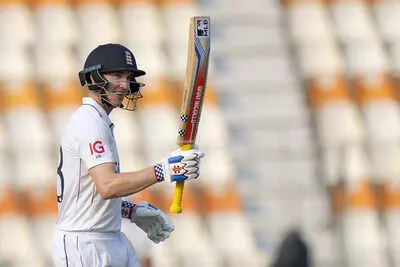
England’s resurgence in the ongoing Test series against India has been fueled by more than just tactics and form—it’s been driven by emotion, pride, and a timely provocation. Batter Harry Brook has lifted the lid on what sparked the team’s renewed intensity: a blunt comment from head coach Brendon McCullum and a fiery on-field showdown at Lord’s.
According to Brook, McCullum challenged the squad behind closed doors, calling them “too nice” after England’s passive showing earlier in the series. That remark lingered in the dressing room, acting as a trigger. The night before the final day of the Lord’s Test, Brook rallied his teammates with a message: “Baz said we were too nice. I think tomorrow is the perfect opportunity to really get stuck into them.”
The message was received loud and clear. What followed was one of the most emotionally charged days in recent English cricket. The Lord’s crowd bore witness to a fired-up England side that confronted India with aggression, intensity, and united resolve. The turning point came when Indian players, particularly Shubman Gill and Mohammed Siraj, began targeting Zak Crawley and Ben Duckett with verbal pressure and strategic delays. England, instead of retreating, struck back—with words, body language, and ultimately, wickets.
Brook described the scene vividly, saying it felt like “11 versus two” when India tried to isolate Crawley and Duckett. The English fielders closed in like a pack, ramping up the pressure, which Brook said was all “within the spirit of the game.” The environment became a cauldron of tension, but England thrived in it. Their comeback was sealed with a dramatic 22-run victory—marking a major shift in momentum ahead of the fourth Test in Manchester.
The confrontations didn’t go unnoticed. Siraj’s fiery send-off for Duckett earned him a fine, while tempers flared during a collision between Brydon Carse and Ravindra Jadeja. But Brook insisted England’s response was sharp, smart, and collective. There were no personal attacks—just a firm reminder that England would no longer be passive.
That emotional pivot, Brook believes, turned the series. “It might have given them that little bit of added pressure and thankfully they ended up crumbling,” he said. With the series finely poised, England now heads to Old Trafford with momentum on their side—and a clearer sense of identity.
Brook admitted the team isn’t ruling out more aggression going forward. “We’ll see whether it happens again and whether it works,” he said. “We’re not out to pick fights, but we won’t back down either.”
As the fourth Test begins on July 23, the psychological battle may prove as decisive as the cricket itself. England, fueled by pride and provocation, has rediscovered its bite. India, a team that thrives under fire, will aim to answer with performance, not just presence.
What’s clear is that the contest is no longer just about runs and wickets—it’s about mindset, pride, and control. And with tensions already simmering, Old Trafford could be the stage for the most explosive battle yet.

